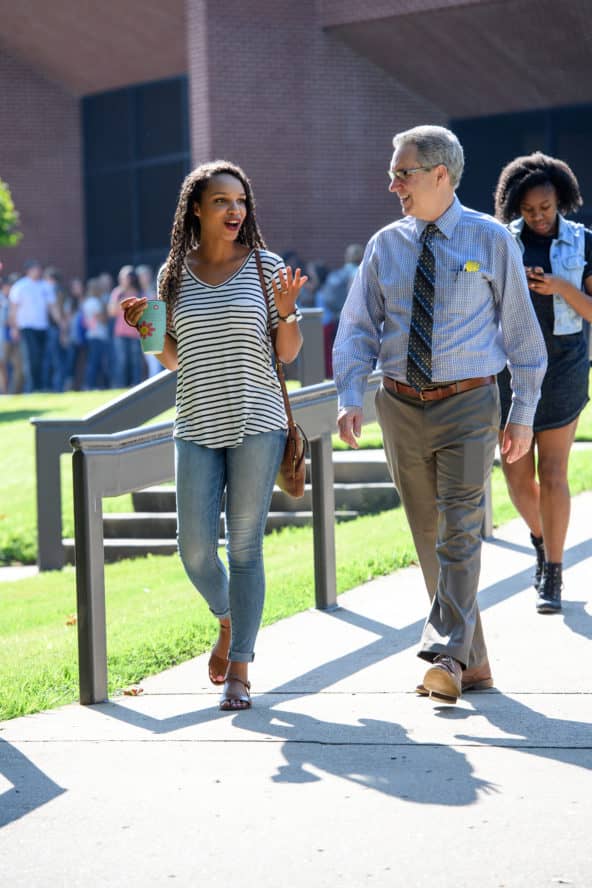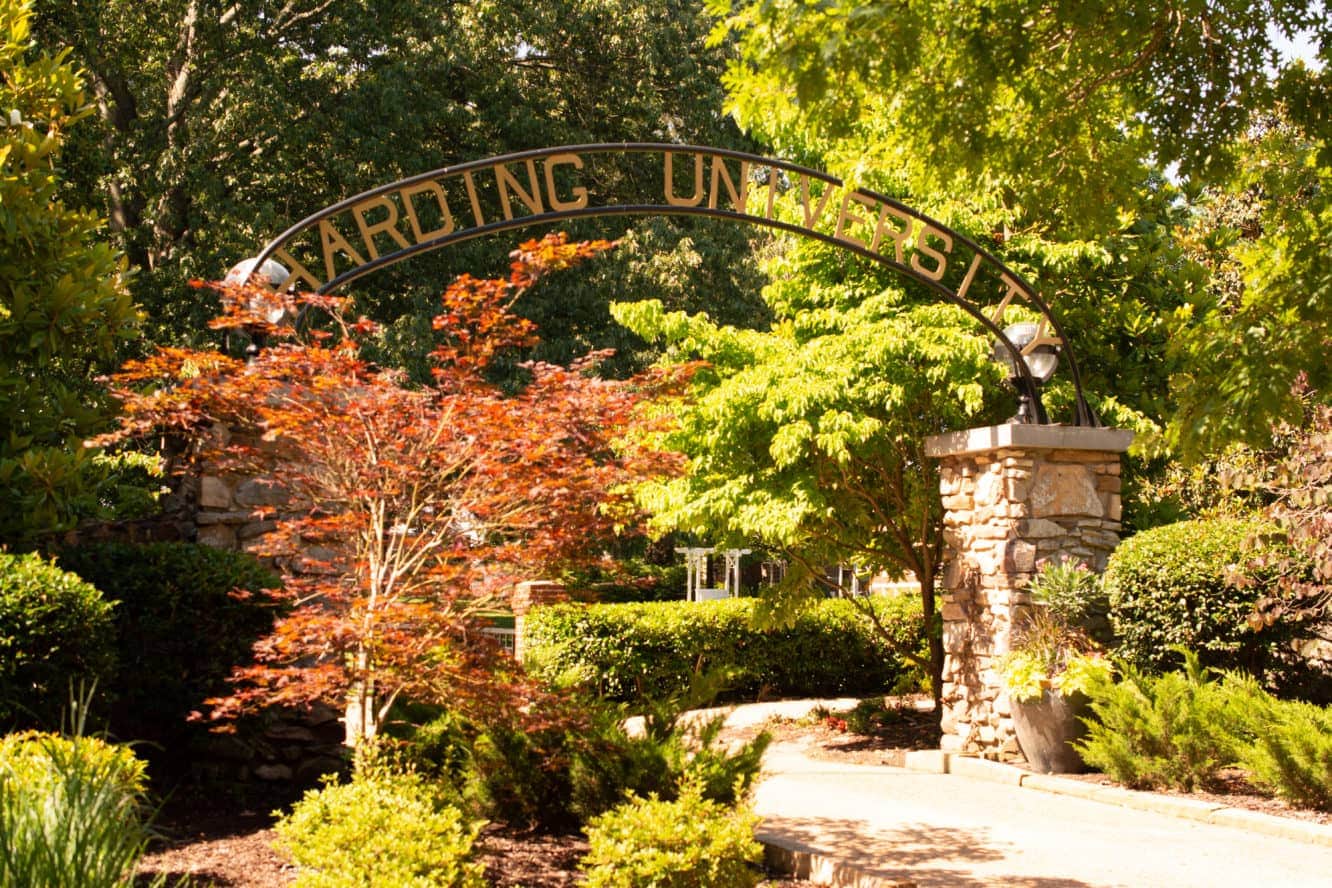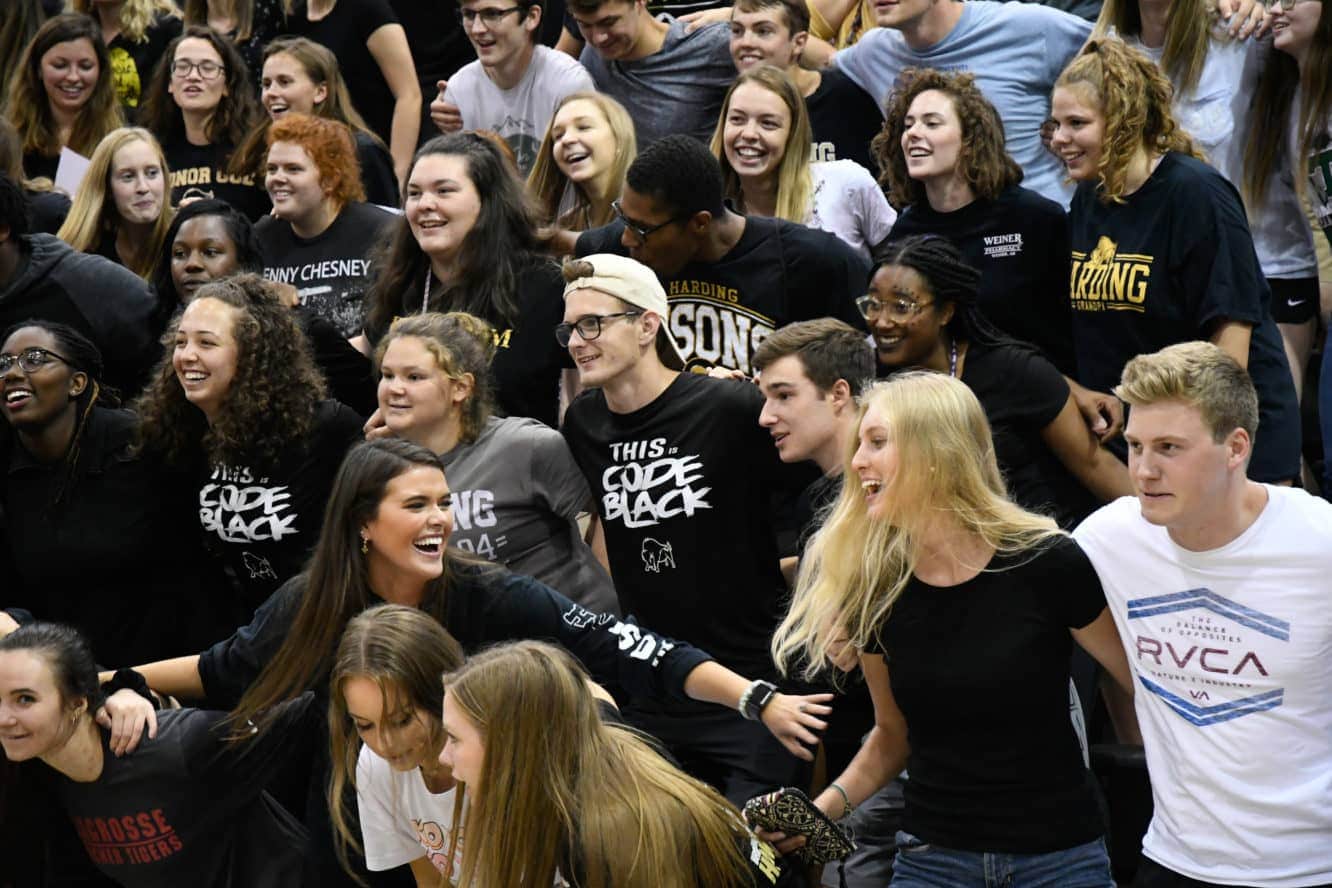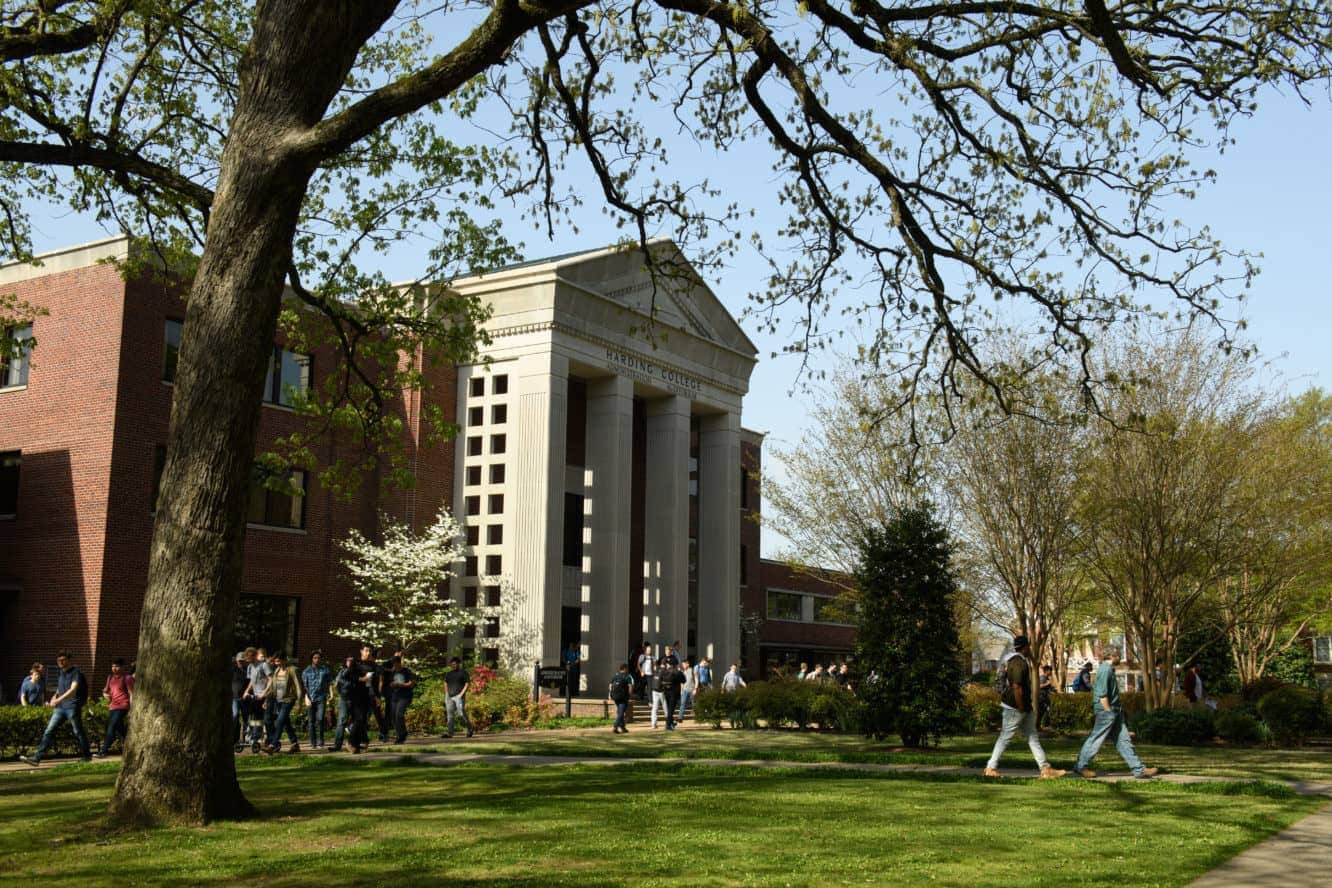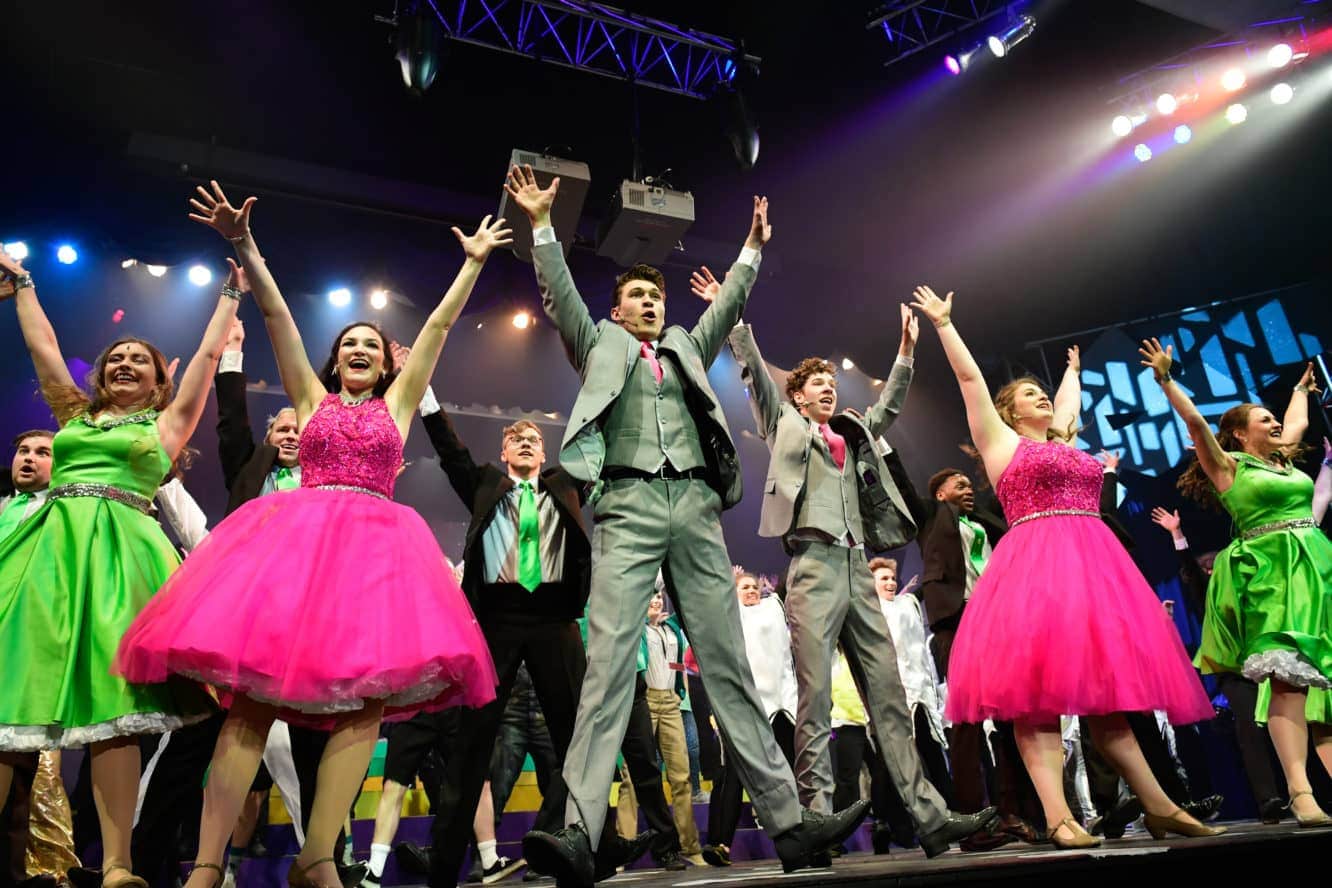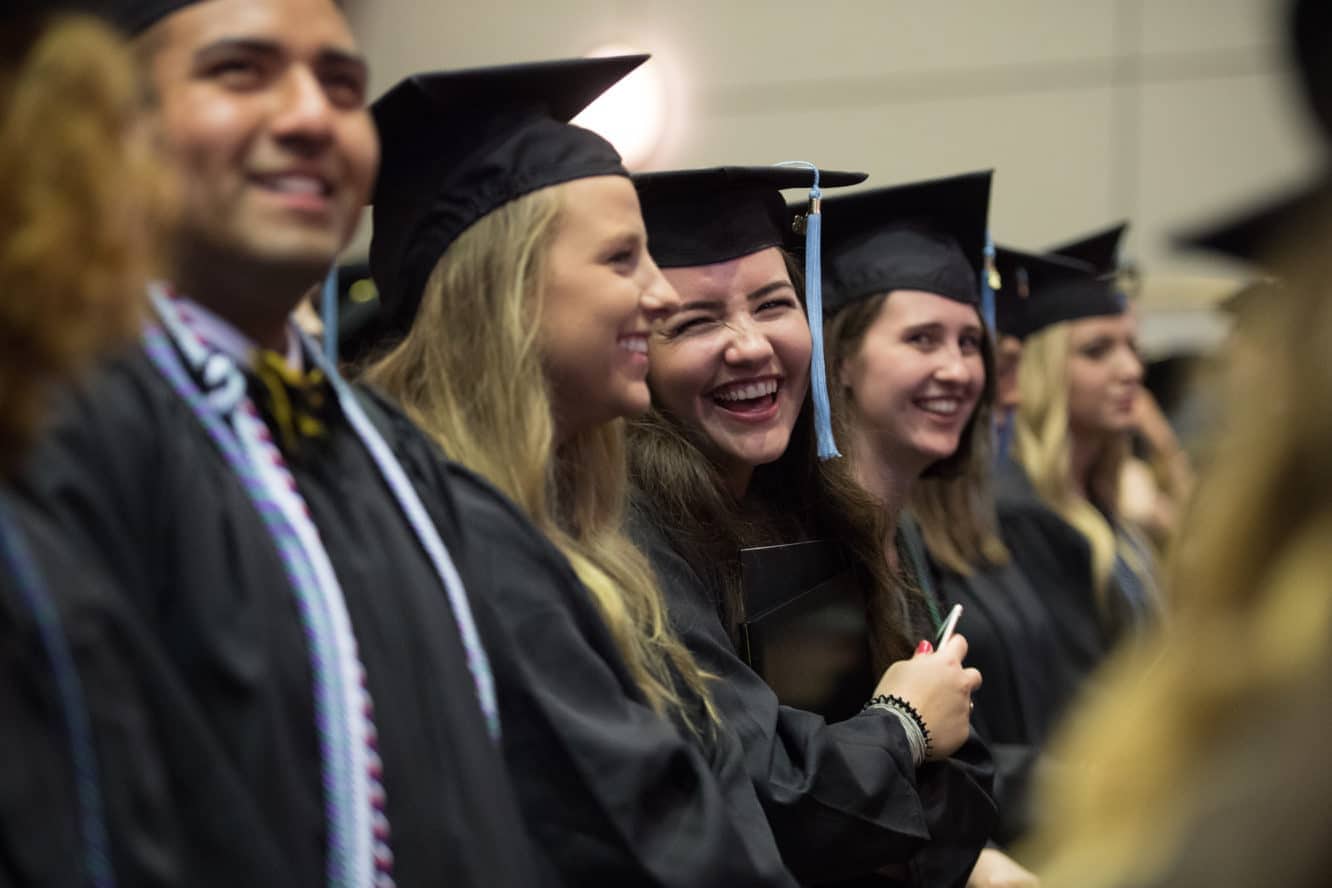Harding University
Searcy, Arkansas

Harding University was last recognized as a College of Distinction in the 2024-2025 academic year.
Harding University is a private, Christian, liberal arts university located in Searcy, Arkansas. Committed to the pursuit of academic excellence and the establishment of strong spiritual foundations, the University attracts students from across the U.S. and more than 50 nations and territories.
Harding offers 10 undergraduate degrees in more than 100 majors and 14 preprofessional programs. Master’s degree programs are offered in athletic training, business, clinical mental health counseling, education, information systems, marriage and family therapy, ministry, nursing, school counseling, speech-language pathology, and physician assistant studies. Doctoral programs are offered in Bible, education, pharmacy, and physical therapy.
Educated with a global perspective, nearly half of all students take advantage of an international experience through summer or spring break mission trips and study abroad programs in Australasia, Chile, England, Greece, Italy, and Zambia.
Harding is accredited by the Higher Learning Commission. The University also maintains specialized accreditation for more than 50 degrees/majors offered by colleges, departments, and programs. These programs all benefit from the rigorous program review requirements in the accreditation process, the standards of which are based on national standardized outcomes.
Get to know Harding University
College Highlights
DAILY CHAPEL
For 30 minutes every weekday, the entire student body assembles for chapel—a time-honored tradition of worship, community building, and affirmation of Harding’s identity as a Christian university. Led by the University president, this shared experience facilitates and strengthens the relationships within the Harding community. Times of joy, sadness, stress, and success are all felt and supported by the University’s collective community.
COLLABORATIVE PROJECTS
Teamwork and interdisciplinary studies are essential tools for students’ leadership and success. Throughout its various colleges and departments, Harding offers multiple opportunities for students of differing majors to engage in collaborative projects. “A Night at the Round Tables” simulates real-world collaboration for healthcare professionals by bringing together six academic departments and students for a case study. A branding exhibition groups together marketing, interior design, and graphic design students for an annual project. A seminar class in New York City and Washington D.C. offers experiential learning for mass communications, English, business, and theatre students. These projects—and many others—help connect students of various disciplines in order to achieve a well-rounded academic experience.
UNDERGRADUATE RESEARCH
Because Harding is a teaching institution, professors frequently pursue research efforts that are specifically designed to engage their students. In the College of Sciences, students can conduct a variety of annual research projects with scholarship funding from NASA. Whether they control a robotic arm using an Android phone, develop 3-D hybrid rocket fuel grains, or build robotic devices to maintain healthy plants during space missions, these students are putting their knowledge to work.
STUDY ABROAD
Harding maintains semester-long international programs in seven different locations: Australasia, England, Italy, Greece, Latin America, France, and Zambia. Additionally, students can enroll in department-specific, short-term programs such as Art and Design International or Mostly Music.
Harding University in Australasia features an extensive stay in Queenstown, New Zealand, and includes tours of Australia, one or more trips to Asian countries like Cambodia and Thailand, and a potential visit to India.
Harding University in England, offered in the fall and spring, begins with a week-long trip to Iceland. Students live in central London, experiencing Hyde Park, the National Gallery, Theatre District, and British Museum. Field trips to other important and historical sites include Bath, Cambridge, Dublin, Edinburgh, the Lake District, Paris, Stratford-on-the-Avon, and Stonehenge.
Harding University in Florence, Italy, brings students to an authentic 16th-century villa on the outskirts of Florence in order to experience some of the world’s most impressive art and architecture. They bargain in outdoor markets; learn to speak Italian; and visit Cinque Terre, Rome, and Southern Italy on group trips.
Harding University in Greece hosts students in an apartment-style resort located in Porto Rafti, considered the most beautiful harbor in Greece. Group tours often include trips to Athens, Corinth, Delphi, Sounion, Olympus, Israel, Cyprus, and Rome. Emphasis is given to sites of biblical interest.
Harding University in Latin America students live and study in apartments in Vina del Mar, Chile, a seaside resort city located 70 miles northwest of Santiago. Several extensive excursions include Santiago, Easter Island, the Lake District of Chile, Torres del Paine, the Atacama Desert region, the Amazon rainforest, and the ancient Inca civilization of Machu Picchu, Peru.
Harding University in Zambia allows students to complete a health missions or medical missions minor in one semester. Students live in a compound that holds the George S. Benson Teachers College as well as an elementary and high school, medical clinic, orphanage, and a “haven” for infants and toddlers who have lost their mothers to AIDS. Classes include Tonga language lessons, African history and African literature, and group trips include safari tours in East Africa as well as Victoria Falls, Lake Victoria, and Kenya.
ENROLLMENT BY ETHNICITY
Non-U.S. Citizen: 6%
Hispanic/Latinx: 4%
Black or African American, non-Hispanic: 5%
White, non-Hispanic: 80%
Native/Indigenous American or Alaska Native, non-Hispanic: 0%
Asian, non-Hispanic: 1%
Native Hawaiian or other Pacific Islander, non-Hispanic: 0%
Two or more races, non-Hispanic: 4%
Race and/or ethnicity unknown: 0%
FIRST YEAR EXPERIENCE
Making key connections in the first year of college is critical to student success, so Harding’s First Year Experience program engages new students during the summer and first-week orientations. The required summer orientation program, Bison Bound, is offered in June, July, and August for students to connect and to begin their academic advising and scheduling.
Student Impact, the orientation prior to the first week of school, is planned and conducted by upperclassmen to encourage new friendships through move-in assistance, service activities, question and answer sessions, and themed dinners.
First Year Experience also provides student mentoring, learning enhancement seminars, and several other events and programs throughout the year in an effort to connect students to the necessary people, programs, and the essential resources for a successful collegiate career.
In addition to Harding’s orientation programs, FYE organizes freshman and transfer retreats that help students adjust in the fall as well as a “preunion” to celebrate the completion of their first year in the spring. An organization fair in the first month of classes helps plug students into more than 100 academic, professional, and social organizations on campus.
As a more personal aspect of first year experience, freshmen are matched with student mentors in their first semester. Students are sorted into groups by their Bible class during orientation and led by peer guides, upperclassman mentors who enroll in freshman-level Bible classes in the fall. These mentors support students as they navigate their first semester.
WRITING-INTENSIVE COURSES
Skills in reading, writing, speaking, and critical thinking are universally regarded as characteristics of well-educated individuals and fundamental to every academic endeavor. For this reason, the University requires classes that emphasize writing and speech in its liberal arts requirements. All students take Introduction to University Writing and Research, Critical Reading, Thinking and Writing, and Communication Principles. Writing is integrated into many courses across the University, the intensity of which vary across fields of study. The University library includes a Writing Center staffed with experienced writers ready to edit, review, and help revise papers or answer any writing questions.
NEW MAJORS
Several new University programs have become available as of fall 2019.
Medical humanities is a growing interdisciplinary field that brings the perspectives of social sciences, humanities, and the arts to the study and practice of medicine. Studying medical humanities connects students with the personal side of medicine, providing a more expansive view of career opportunities by combining what students may love in humanities with how they want to serve in health sciences. With a medical humanities major, students can pursue careers in public health, public policy, law, medical missions, and more. This is an appropriate major for those preparing for medical school, occupational therapy school, physician assistant school, or other areas in the health sciences.
The University now offers a Master of Science in athletic training, a Master of Science in information systems, and dual-degree tracks to both of these degrees with their undergraduate prerequisites.
Other new majors include environmental science, forensic science, film, integrated marketing communication, integrative studies, and multimedia journalism.
WALDRON CENTER FOR ENTREPRENEURSHIP AND FAMILY BUSINESS
This center in the Paul R. Carter College of Business Administration focuses on entrepreneurial academics and competitions as well as business development. The center complements the college’s entrepreneurship classes by empowering innovators and facilitating student participation in such competitions as the Donald W. Reynolds Governor’s Cup. The Center also keeps a regular blog featuring startup and success stories of students and alumni.
ON-CAMPUS LIVING
From its beginnings, Harding has been a residential campus with the majority of undergraduate students living in University housing. Campus housing includes six men’s and eight women’s residence halls as well as five student apartment complexes. Because of the number of residential students, there is never a shortage of convenient, inexpensive options for relaxation and entertainment.
Every year, well-known musicians, singers, bands, speakers, authors, and comedians are brought to campus. In recent years, artists like Jesse McCartney, Tori Kelly, Ben Rector, Maddie and Tae, and Lacrae have performed for Harding students in the Benson Auditorium.
WORLD-CLASS RECREATION FACILITIES
The recently renovated Ganus Activities Complex exists to further the University’s initiatives dedicated to the availability of wellness and recreation opportunities to students. The complex includes the Jim Citty Football and Athletic Training Center, kinesiology and exercise and sports sciences classrooms, and the new Suzanne and Rodney Waller Recreation Center.
The Waller Recreation Center includes a two-story weight room with state-of-the-art Matrix plate-loaded weight machines and Troy-brand Olympic free weights. There is also a wide selection of cardio equipment, including ellipticals, treadmills, and stair machines with built-in TVs and virtual trainers. These machines line along the full-glass front of the building, allowing students views of the campus during their exercise.
Other features of the facility remodel include refurbished racquetball courts, a suspended indoor track, a cycling room, a billiards room, pingpong tables, and new floors and basketball goals. New partitioning curtains can separate multiple basketball and volleyball courts so that multiple student groups can utilize the space simultaneously. With these updates, classes like indoor cycling, Zumba, and yoga have been added. Whether in class or on their personal time, the recreation center facilitates all students who seek an active lifestyle.
STUDENT LIFE
Relationships are key to a fulfilling college experience, and Harding offers students every opportunity to cultivate friendships and interests with more than 100 academic and professional organizations as well as 30 social clubs. Supporting the arts, music, politics, business, diversity, children, missions, service, and the environment, Harding’s clubs provide a place for all pursuits and passions.
A large percentage of the student body chooses to join a social club, Harding’s version of fraternities and sororities. Social clubs have been a significant part of the Harding experience for decades, with some—such as Ju Go Ju—dating back more than 90 years. These groups provide students with opportunities to enjoy a significant number of activities, all while building lifelong friendships.
A COMMUNITY OF SERVICE
Every spring, students, faculty, and staff look beyond campus and devote themselves to helping residents of Searcy and Central Arkansas through a day of service known as Bisons for Christ. Thousands participate in hundreds of service projects such as serving widows in their homes, visiting retirement communities and children’s homes, assisting in cleanup at local camps, working with after-school programs, or hosting sport clinics. Students experience the joy that comes from serving others, and relationships within the community are forged and strengthened.
SCHOOL LOCATION
Harding is located in Searcy, Arkansas, offering students a hometown feeling with easy access to major cities. The University is approximately one hour away from both Little Rock, Arkansas, and the Bill and Hillary Clinton National Airport, and two hours away from Memphis, Tennessee. Located in The Natural State, University students have many nearby options for recreation, such as the Little Red River, Pinnacle Mountain, and the Petit Jean State Parks for fishing, camping, hiking, and other outdoor activities. Arkansas is home to 52 state parks.
ATHLETICS
Harding University is a member of the NCAA Division II Great American Conference. Men’s sports include baseball, basketball, cross-country, football, golf, soccer, tennis and track. Women’s sports include basketball, cheerleading, cross-country, golf, soccer, softball, tennis, track, and volleyball.
The 2016-17 athletic season was one for the record books, with Harding athletes claiming eight conference championships in football, men’s soccer, men’s track and field, women’s cross-country, women’s soccer, softball, women’s track and field, and volleyball. Additionally, the University’s football team advanced to the NCAA Division II semifinals, and women’s basketball ended their season in the Final Four.
RESIDENCE LIFE
Percent of students living on campus.
First-time, first-year (freshman) students: 98%
Undergraduates: 71%
Campus housing options.
Men’s dorms
Women’s dorms
Apartments for married students
Apartments for single students
Special housing for disabled students
SERVICE-LEARNING
As a community of mission, Harding aims to equip every student to serve and reflect Christ in any chosen field. For this reason, service components within classwork are not uncommon.
Nursing students conduct free wellness clinics for children and adults in two different required classes. In a similar manner, the communication sciences and disorders program operates a speech clinic in which students serve the community as they learn the discipline.
Students in the College of Business Administration or the department of communication often partner with local businesses to complete class projects. The capstone class for management information systems requires teams to develop and build a system to assist a business or organization in their responsibilities. Public relations students as a class have coordinated campaigns for local events, new businesses, and ballot measures.
These service components are not mandated by the University but rather are initiated by a campus culture that emphasizes servant leadership and learning both inside and outside the classroom.
CAREER SERVICES
All students have access to the resources housed in the University’s Career Services including career planning and advising, career-based presentations and events, and comprehensive information on employment and internship opportunities. In addition to honing students’ skills like resume and cover letter writing, the center facilitates on-campus graduate fairs or job fair events like “C-Harmony,” a networking event with a speed-dating format to connect churches to potential interns and ministers.
INTERNSHIPS AND PRACTICUMS
Internships and practicums can introduce students to real-world environments and connect classroom knowledge to professional techniques and opportunities. Many programs require an internship, practicum, or both be completed for course credit. Several examples of practicum classes are those that contribute to the University’s award-winning student media. The campus radio station, TV station, newspaper, and yearbook are all in part facilitated by practicum classes each semester.
CAPSTONE AND SENIOR EXPERIENCES
In every college and department, seniors are required to demonstrate their skills as part of a capstone course. The requirements of the capstone vary depending on the student’s field of study, but many include aspects like a research paper, practical application or project, and public presentation.
Admission
ADMISSIONS FACTORS
Very Important
Rigor of secondary school record | Standardized test scores | Recommendation(s)
Interview | Character/personal qualities
Important
Class rank | Academic GPA | Talent/ability
Considered
Application Essay | Extracurricular activities | First generation
Alumni/ae relation | Geographical residence | State residency
Volunteer work | Work experience | Level of applicant’s interest
FRESHMAN PROFILE
SAT Evidence-Based Reading and Writing
25th Percentile: 540 | 75th Percentile: 650
SAT Math
25th Percentile: 520 | 75th Percentile: 640
ACT Composite
25th Percentile: 21 | 75th Percentile: 29
ACT Math
25th Percentile: 19 | 75th Percentile: 27
ACT English
25th Percentile: 21 | 75th Percentile: 32
APPLICATION INFORMATION
Students wishing to apply to Harding must have a 19 ACT or 900 SAT and 3.0 high school GPA (on a 4.0 scale). In addition, high school graduates should have completed at least 15 units in academic subjects. Specifically, an applicant should have completed four units of English, three units of mathematics (taken from general math, geometry, algebra, trigonometry, precalculus or calculus), three units of social studies (taken from civics, American history, world history or geography), and two units of natural science (taken from physical science, biology, physics or chemistry). Students planning to major in any area of healthcare are strongly encouraged to take one or more chemistry courses while in high school. Although not required for admission, two years of foreign language is recommended. The additional units may come from any academic area.
Tuition & Cost
Tuition: $21,000
Fees: $540
Room: $3,888
Board: $4,558
Aid
More than 90 percent of the student body at Harding University receive financial aid. Approximately $60 million is awarded by federal, state, and private sources. Academic scholarships at Harding include National Merit Scholarships and Trustee Scholarships that cover the full amount of tuition, the academic achievement scholarships that covers up to about half of tuition, and transfer student scholarships. Harding also offers need-based grants and tuition discounts to Christian college employees, Christian ministers and missionaries, orphans, and others. Harding also offers special scholarships such as the Scouting Scholarship, awarded to full-time students who have earned the rank Gold Award (Girl Scouts of the USA), the Stars and Stripes Award (American Heritage Girls), Eagle (Boy Scouts of America), Silver Award (Venturing), or Quartermaster Award (Sea Scouts).
Contact Harding University
Contact Admissions
harding.edu/admissions
(800) 477-4407
admissions@harding.edu
Campus Location
915 E. Market Avenue
Searcy, AR 72149
(501) 279-4000
